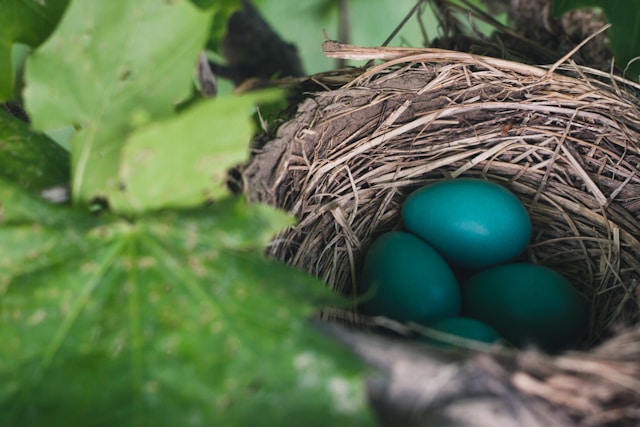A European-led operation uncovers a staggering collection of 3,404 illegal bird eggs in Tasmania, highlighting the growing threat of wildlife crime
In a significant blow to illegal wildlife trade, Australian authorities have seized 3,404 rare bird eggs from a property in Granton, Tasmania. The seizure, discovered on July 9, followed an extensive European operation targeting the illicit bird egg trade and is estimated to be worth between A$400,000 and A$500,000 (£207,000 – £259,000).
The collection, which includes eggs from threatened and potentially endangered species, was found hollowed out—meaning the contents had been removed, leaving only the ornamental shells. The eggs’ primary value was thus for collectors rather than for conservation or scientific purposes. A 62-year-old man is under investigation in connection with the case, although no arrests have been made yet.
Embed from Getty ImagesEnvironmental crime, particularly in the realm of wildlife trafficking, has surged to become one of the most lucrative and damaging illegal industries globally. This trend exacerbates the risk of extinction for many species, underscoring the need for stringent enforcement and conservation efforts.
The Australian suspect is expected to face charges under the Environment Protection and Biodiversity Act 1999. According to officials from the Department of Climate Change, Energy, the Environment, and Water (DCCEEW), the individual is alleged to have been involved in the illegal collection and trading of both native Australian and CITES-listed bird eggs. CITES, the Convention on International Trade in Endangered Species of Wild Fauna and Flora, aims to regulate and protect endangered species from international trade threats.
Authorities are currently analyzing the eggs to confirm their species, with preliminary investigations suggesting they include rare and threatened species such as the forty-spotted pardalote, found only on Tasmania’s Bruny Island, the swift parrot, and the shy albatross. These species face high extinction risks, making their illegal trade particularly concerning.
The European investigation that led to this seizure is part of a broader crackdown on illegal wildlife trade, which saw over 56,000 eggs confiscated in 2023 alone. The international wildlife trade, including live animals and their by-products, is a billion-dollar industry with over 40,000 species covered under CITES agreements involving more than 180 countries, including Australia.
Dr. Sally Bryant, a Tasmanian ecologist, expressed concern over the scale of illegal egg collecting, which she believes is more prevalent than commonly recognized. She condemned the practice as outdated, ethically corrupt, and a product of skilled operators accumulating collections over many years.
The legal consequences for interfering with threatened and migratory birds in Australia are severe, including up to seven years in prison and fines up to A$138,600. More serious offences, such as the export of native Australian specimens or those on the CITES list, carry penalties of up to ten years in prison and fines of A$330,000. Possession of CITES-listed specimens is also punishable by up to five years in prison and similar fines.
Minister for the Environment and Water, Tanya Plibersek, condemned the illegal wildlife trade, emphasizing the threat it poses to already endangered species. “We have to stamp out this terrible trade which sees our native animals captured in the Aussie bush and sent overseas to be sold,” she stated, reinforcing the commitment to combat such environmental crimes.
Analysis
Political The seizure of thousands of rare bird eggs highlights the significant challenges faced by global and national regulatory frameworks in combating wildlife crime. The involvement of international law enforcement underscores the need for cross-border cooperation to address complex and lucrative illegal wildlife trades. The case may prompt Australian authorities to strengthen their policies and enforcement strategies, influencing broader political discourse on environmental protection and international collaboration.
Social The discovery of such a large collection of illegal bird eggs reflects broader societal issues regarding the commodification of wildlife. It draws attention to the ethical concerns surrounding the collection and trade of endangered species. This case may lead to increased public awareness and advocacy for wildlife conservation, influencing social norms and behaviours related to environmental stewardship and animal rights.
Racial While the immediate context does not involve racial issues, the international nature of wildlife trafficking often intersects with discussions on global inequality and the exploitation of vulnerable species. The trade’s impact on local ecosystems and indigenous communities can indirectly highlight racial and cultural dimensions of environmental justice and conservation efforts.
Gender The case does not specifically address gender issues; however, it underscores the role of various actors in the illegal wildlife trade, including both men and women involved in such activities. Gender dynamics in environmental crime can be explored in broader contexts, such as examining the roles and impacts of different genders in conservation and illegal trade networks.
Economic The economic implications of the illegal wildlife trade are substantial, with the industry valued in the billions of dollars. The seizure in Tasmania reflects the high value placed on rare and endangered species, impacting local and global economies. It highlights the need for economic incentives to support conservation efforts and the importance of disrupting illegal trade networks that undermine legitimate markets and conservation initiatives.
